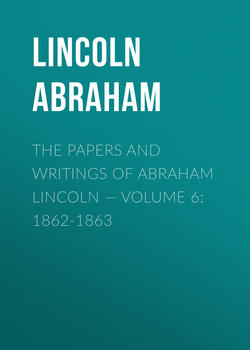Читать книгу The Papers And Writings Of Abraham Lincoln — Volume 6: 1862-1863 - Lincoln Abraham - Страница 9
PROCLAMATION REVOKING GENERAL HUNTER'S ORDER OF MILITARY EMANCIPATION,
ОглавлениеMAY 19, 1862
BY THE PRESIDENT OF THE UNITED STATES OF AMERICA:
A Proclamation
Whereas there appears in the public prints what purports to be a proclamation of Major general Hunter, in the words and figures following, to wit:
(General Orders No. 11) HEADQUARTERS DEPARTMENT OF THE SOUTH, HILTON HEAD, PORT ROYAL, S. C., May 9, 1862.
"The three States of Georgia, Florida, and South Carolina, comprising the military department of the South, having deliberately declared themselves no longer under the protection of the United States of America, and having taken up arms against the said United States, it became a military necessity to declare martial law. This was accordingly done on the 25th day of April, 1862. Slavery and martial law in a free country are altogether incompatible. The persons in these three States: Georgia Florida, and South Carolina — heretofore held as slaves are therefore declared forever free.
"By command of Major-General D. Hunter: "(Official.)ED. W. SMITH, "Acting Assistant Adjutant-General."
And whereas the same is producing some excitement and misunderstanding: therefore,
I, Abraham Lincoln, President of the United States, proclaim and declare that the Government of the United States, had no knowledge, information, or belief of an intention on the part of General Hunter to issue such a proclamation; nor has it yet any authentic information that the document is genuine. And further, that neither General Hunter nor any other commander or person has been authorized by the Government of the United States to make a proclamation declaring the slaves of any State free; and that the supposed proclamation now in question, whether genuine or false, is altogether void so far as respects such a declaration.
I further make known that whether it be competent for me, as commander-in-chief of the army and navy, to declare the slaves of any State or States free, and whether, at any time, in any case, it shall have become a necessity indispensable to the maintenance of the government to exercise such supposed power, are questions which under my responsibility I reserve to myself, and which I cannot feel justified in leaving to the decision of commanders in the field.
These are totally different questions from those of police regulations in armies and camps.
On the sixth day of March last, by special message, I recommended to Congress the adoption of a joint resolution, to be substantially as follows:
Resolved, That the United States ought to co-operate with any State which may adopt gradual abolishment of slavery, giving to such State pecuniary aid, to be used by such State, in its discretion, to compensate for the inconvenience, public and private, produced by such change of system.
The resolution in the language above quoted was adopted by large majorities in both branches of Congress, and now stands an authentic, definite, and solemn proposal of the nation to the States and people most immediately interested in the subject-matter. To the people of those States I now earnestly appeal. I do not argue — I beseech you to make arguments for yourselves. You cannot, if you would, be blind to the signs of the times. I beg of you a calm and enlarged consideration of them, ranging, if it may be, far above personal and partisan politics. This proposal makes common cause for a common object, casting no reproaches upon any. It acts not the Pharisee. The change it contemplates would come gently as the dews of heaven, not rending or wrecking anything. Will you not embrace it? So much good has not been done, by one effort, in all past time, as in the providence of God it is now your high privilege to do. May the vast future not have to lament that you have neglected it.
In witness whereof, I have hereunto set my hand and caused the seal of the United States to be affixed.
Done at the city of Washington, this nineteenth day of May, in the year of our Lord one thousand eight hundred and sixty-two, and of the independence of the United States the eighty-sixth.
A. LINCOLN.
By the President: WILLIAM H. SEWARD, Secretary of State.
